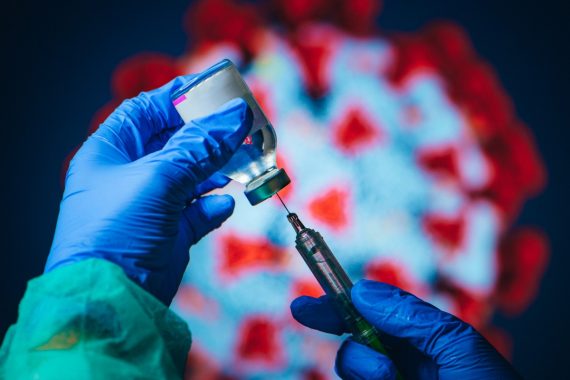Pfizer vaccine effective against new Covid variants, lab study suggests

Virus mutations recently discovered in the UK and South Africa ‘do not create resistance’ to the Pfizer/BioNTech vaccine, the manufacturer has announced.
It comes as the Government has announced that the MHRA has authorised the Moderna vaccine for use in the UK – with doses to become available from the spring.
A study carried out by Pfizer and the University of Texas Medical Branch (UTMB), published as a pre-print today, found that the vaccine elicits antibodies that ‘neutralise’ the mutated virus, Pfizer said.
It said: ‘[Results show that] the antibodies from people who have received the Pfizer-BioNTech Covid-19 vaccine effectively neutralise SARS-CoV-2 with a key mutation that is also found in two highly transmissible strains.’
The in vitro study tested the vaccine against the N501Y Covid mutation, which is found in the spike proteins of both the virus variations discovered in the UK and South Africa and is associated with rapid transmission.
Pfizer said: ‘To determine if sera of people who had received the Pfizer-BioNTech Covid-19 vaccine could neutralise SARS-CoV-2 with the N501Y mutation, a virus with this substitution was generated in UTMB’s laboratory.
‘The sera of 20 participants from the previously reported Phase 3 trial neutralised the virus with the mutation as well as they neutralised virus without the mutation.’
Pfizer added that although further data are needed to monitor the vaccine’s effectiveness in preventing Covid caused by new virus variants, it is ‘encouraged’ by the ‘early’ in vitro study findings.
It said: ‘While the virus tested in this experiment did not include the full set of spike mutations found on the rapidly spreading strains in the UK or South Africa, neutralisation of virus with the N501Y mutation by the Pfizer-BioNTech vaccine-elicited human sera is consistent with preserved neutralisation of a panel of 15 pseudoviruses bearing spikes with other mutations found in circulating SARS-CoV-2 strains.
‘This indicates that the key N501Y mutation, which is found in the emerging UK and South Africa variants, does not create resistance to the Pfizer-BioNTech vaccine-induced immune responses.’
It added: ‘If the virus mutates such that an update to the vaccine is required to continue to confer protection against Covid-19, we believe that the flexibility of BioNTech’s proprietary mRNA vaccine platform is well suited to enable an adjustment to the vaccine.’
Phil Dormitzer, Pfizer vice president and chief scientific officer of viral vaccines, told Reuters that it is ‘good news’ that the vaccine appears effective against the 16 variants so far tested, but that others could still pose a problem.
He said: ‘We’ve now tested 16 different mutations and none of them have really had any significant impact. That’s the good news, [but] that doesn’t mean that the 17th won’t.’
Meanwhile, the Department of Health and Social Care (DHSC) has today announced that the MHRA has approved the US Moderna vaccine for roll-out in the UK.
The UK Government has ordered an additional 10m doses of the newly-authorised vaccine, but the total 17m ordered so far will not be available until the spring, it said.
The DHSC added that the JCVI will submit ‘updated advice’ on which groups should be prioritised for vaccination ‘before doses become available’.
The NHS is putting into place ‘extensive preparations for the roll out of the Moderna vaccine ahead of the spring’, it said.
The vaccine will be deployed through ‘similar methods’ as the Pfizer and Oxford vaccines – via hospital hubs for ‘NHS and care staff and older patients’, vaccination centres and ‘community services’ staffed by ‘local teams and GPs’, it added.
Health secretary Matt Hancock said: ‘This is further great news and another weapon in our arsenal to tame this awful disease.
‘We have already vaccinated nearly 1.5 million people across the UK and Moderna’s vaccine will allow us to accelerate our vaccination programme even further once doses become available from the spring.’
In November, Moderna reported the final results from its vaccine trials, confirming it has shown to be 94% effective. This tallied with interim analysis from trials that reported 95% efficacy.
The Government has set a target for the JCVI’s first four priority groups to be immunised against Covid by 15 February – including all care home residents by the end of January.
Pulse July survey
Take our July 2025 survey to potentially win £1.000 worth of tokens

Visit Pulse Reference for details on 140 symptoms, including easily searchable symptoms and categories, offering you a free platform to check symptoms and receive potential diagnoses during consultations.










